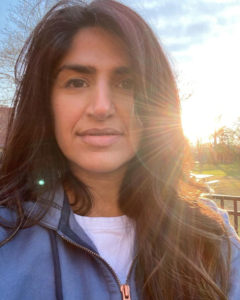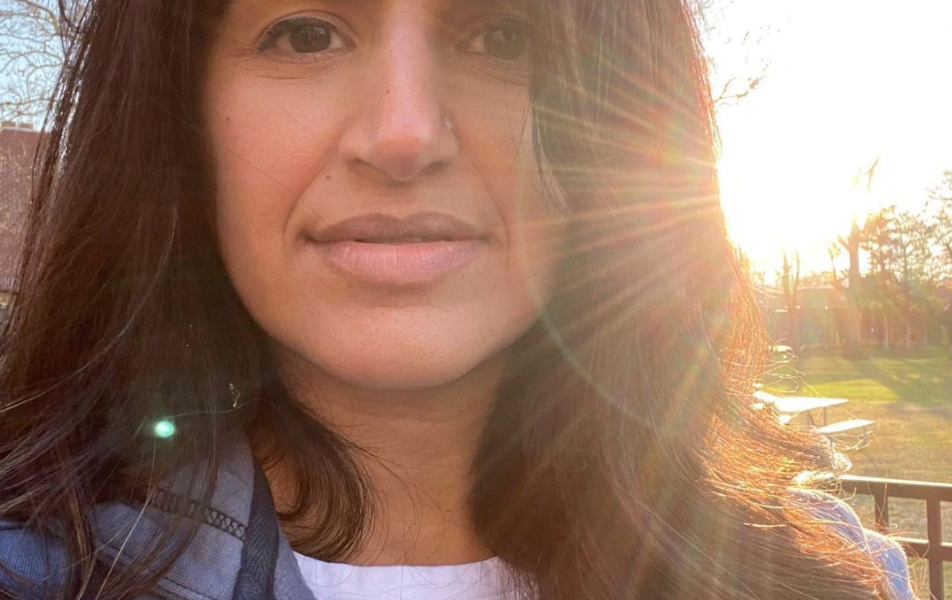
What’s your name? Sucheta Sachdev
Where do you live? Jackson Heights, New York City
What your favorite hangout in NYC (pre-COVID)? Since we’re in a global pandemic, it’s currently my house, but otherwise I love some of the parks we have access to like Riverside Park, Cunningham Park and Juniper Valley. I also have to add—I really love my neighborhood; Jackson Heights has a vibrant immigrant community, you barely ever hear English spoken on the streets. Lots of good food, and when it’s the World Cup, there’s no other place I’d rather be.
What type of work do you do? Music Editor for Television and Film. It took me a long, circuitous route to get here—and I still have a lot to learn—but so far it’s been worth it. I actually went to graduate school for English Literature, and then a second time for International Affairs and Development. I worked all around the world for a couple of years as a Consultant, and then as a Fellow in Development and Media.
When I got back stateside to DC, I realized how much I enjoyed storytelling, and finally after six months of being unemployed, I got first my real gig at the Discovery Channel. I started as a Production Assistant and worked my way up—and soon was working on my own series. During this time, I discovered how much I enjoyed the process of finding music that fit perfectly with what was happening in the scene. Not only did I love it—I found I was pretty good at it.
Eventually, the head of the music department at Discovery took notice of my work and asked me to start and run the music department in New York. I became Music Supervisor and worked on all kinds of content across all of Discovery’s networks.
When I left that role after four years, I started my own shop, but found that I wanted to take it a step further; a Music Supervisor is a creative role and helps find music for visual content, as well as handles the licensing process. But they don’t necessarily have a say as to precisely how the song should be edited to the music. That’s what a Music Editor does, and that’s where you get into the really nitty gritty stuff of figuring out precisely how the song is used and made to enhance what’s going in the picture.
Being a Desi woman in Music Editing is rare for sure. I have yet to meet another one, and if that’s you reading this, I’d love to chat! But, I hope the landscape changes and more women of color are excited to get into the editing side of music and film, especially when they see other women of color have started to do so as well.
I do this work because: I’m convinced in my past life I must have been a Broadway dance choreographer, so being a Music Editor, in some sense, allows me to do the same thing, but for television and film.
What are some Indian traditions you still follow? I married an Indian, does that count? Honestly, not that many. I’m half Punjabi and half Kannadiga, and we follow some Hindu traditions (not necessarily Indian), like Ganesh pooja and Diwali. Those are really the only things we try to uphold—and I use that term loosely—as official festivals in our house. My parents live a few blocks away from us and they are really the ones who inject more formal traditions and touchstones into our lives—as well as keep us fed. My kids’ favorite foods are paratas and idlis!
Bollywood or Hollywood, and why? I lean towards Hollywood, but I’m of the DDLJ and Kuch Kuch Hota Hai generation so I can dig a good desi flick from time to time, especially if it’s by Aamir Khan. I love his films that have a strong social justice component.
Favorite movie? Monsoon Wedding. The soundtrack is phenomenal and every single song is used perfectly to enhance what’s on screen. Nothing is competing for attention; every song serves a purpose. It’s literally perfect.
What’s your favorite thing about Indian culture? It’s twofold. I love that there’s no one way to be Indian. Look at the country our parents came from; with so many languages, religions, foods, and traditions, it’s almost impossible to be Indian in the same way. How does an Assamese person have anything in common with someone from Kerala? And the flip side is, if you plopped both of them down in a room full of strangers with no other people of color, they would be like magnets towards one another and find all the things they have in common! While no cultural experience is singular, on some level, we “get” each other. (And this is just from the country itself; when you think about the diaspora all over the world it’s mind-blowing—from the 3rd and 4th generations of Indians in Kenya/Uganda to the Indians who have been in Trinidad and the West Indies for over a century—the list goes on)
What’s one piece of advice your parents have given you that should probably be or are abiding by? People will talk. You do what’s best for you. I think I’ve tried to keep up with that, and will pass that on to my kids as well.
Good Indian Girl? I’ll defer to Shakespeare here. “There is nothing either good or bad, but thinking makes it so.”



 Ringing in Change: Sakhi’s Historic Achievement
Ringing in Change: Sakhi’s Historic Achievement Good Indian Girl, Sort Of: Sonya Soni
Good Indian Girl, Sort Of: Sonya Soni Ambika Mod Makes Us Bawl Our Eyes Out in ‘One Day’
Ambika Mod Makes Us Bawl Our Eyes Out in ‘One Day’